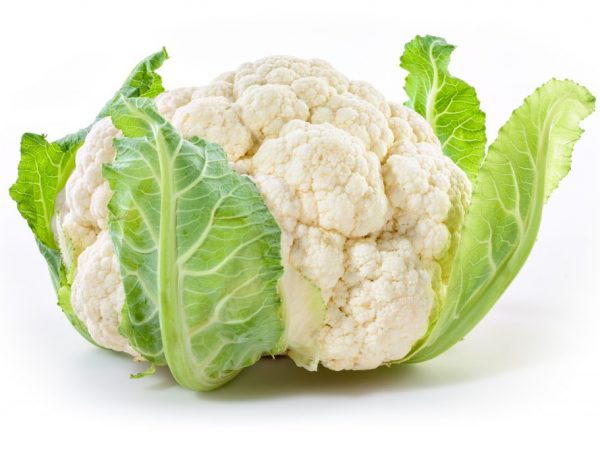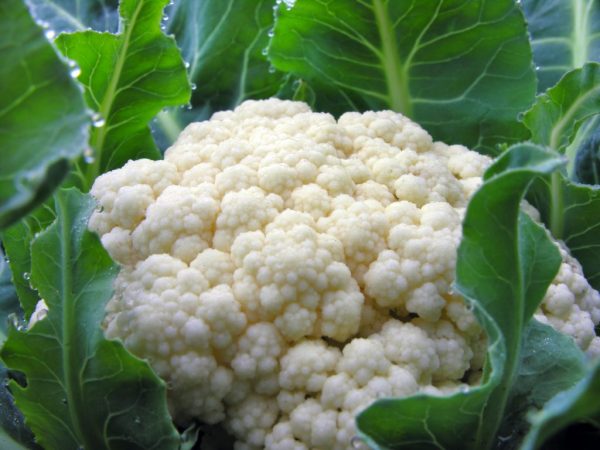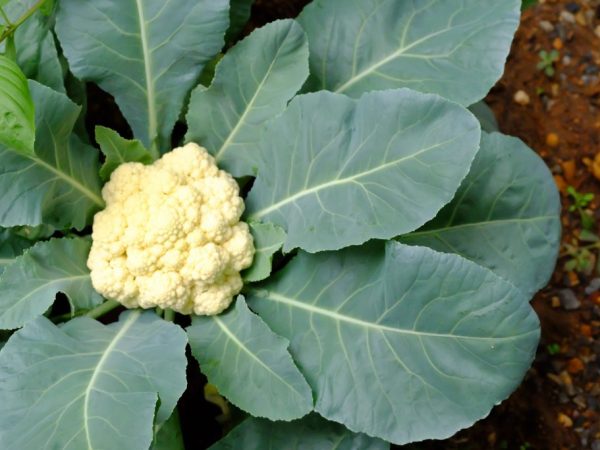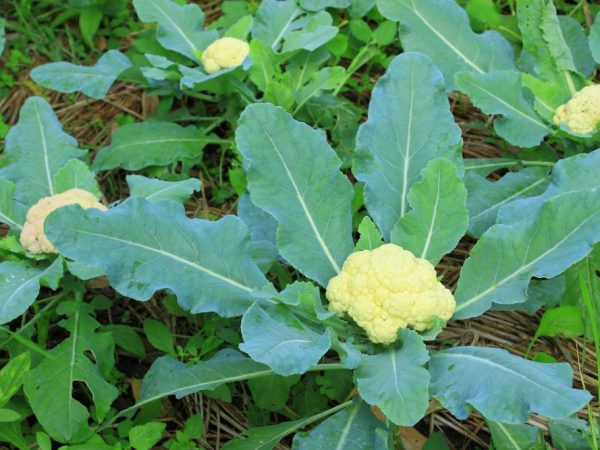Outdoor cauliflower varieties
Gardeners grow cauliflower in their summer cottages throughout Russia. It is more often cultivated in greenhouse conditions, but there are also varieties of cauliflower for open ground that give good yields.

Description of varieties of cauliflower for open ground
Snowball
The cauliflower variety Snow Globe is suitable for the climate of Siberia and the Urals, because it belongs to the early and ripens in 70-90 days.
External features:
- foliage is bright green, long, elliptical, directed vertically upward;
- cabbage heads are white, medium-tuberous, compactly and densely folded, rounded, slightly flattened, each weighing 0.6-1.2 kg,
Yield indicators are about 2 kg per 1 sq. m. The variety is recommended for long-term storage in a freezer.
How to grow
The variety is grown in seedlings. Sowing seeds is carried out in the second decade of March. It is transplanted into open ground after 1.5 months according to the 35 x 50 cm scheme.
The soil
The variety is picky about the fertility of the land and grows poorly on soils with high acidity.
The best predecessors of the Snow Globe variety are cucumbers and beans.
Fertilizers
Before transplanting young seedlings, it is required to even out the acidity of the soil. This can be done by adding ash powder to the soil. For feeding, which for the entire growing season requires at least 2, ammonium nitrate (25 g per 1 sq. M) is best suited. It is scattered between cabbage rows and poured over with water.
Care
The variety is demanding on the quality of irrigation. For each square meter, 10-12 liters of water are added.
Movir
Cabbage variety Movir belongs to the early and can yield twice a season. Terms of technical ripeness - 85 days.
External features:
- foliage is bright green, ellipse-shaped, long,
- cabbage heads are dense, round-flat, lumpy, white, each weighing from 400 g to 1500 g.
Average yield: up to 4 kg per 1 sq. m. The variety has established itself as cold resistance, heat tolerance, as well as resistance to cracking.
How to grow

The Movir variety gives a crop 2 times per season
For seedling cultivation, seeds are sown in the last days of March or early April. Young seedlings are covered with covering material.
The soil
The variety grows well on black soil, but requires sunlight.
The best predecessors for growing Movir are beans, potatoes, cucumbers.
Fertilizers
The varieties require 2 feeding:
- 10 days after transplanting seedlings by introducing urea (10 g), superphosphate (20 g), potassium composition (10 g), diluted in 10 liters of water.
- 2 weeks after the initial one, the same components are introduced, increasing their amount by 1.5 times.
Care
In the process of caring for the Movir variety, they adhere to the systematic watering, which is carried out every 3-4 days, increasing the frequency in hot weather.
Gohan
The Gohan hybrid variety was developed by Syngetta seeds and belongs to the mid-season. It ripens on average in 75 days.
External features:
- leaf color is dark green with a slight waxy bloom,
- foliage of medium size, located in a semi-vertical direction,
- cabbage heads are formed in the shape of an ellipse, not completely closed, each weighing 1.0-1.3 kg.
The Gohan hybrid is distinguished by its high taste characteristics. Its yield indicators range from 4 to 4.5 kg per 1 sq. m. The hybrid has a genetically fixed resistance to cold climatic conditions.
How to grow
It is best to plant the variety using the seedling method. Seeds for sowing are prepared in the last days of February.
The soil

Cabbage needs sunlight
The Gohan hybrid grows best on chernozem lands, the acidity of which is in the range from 6.5 to 6.8 pH. The chosen landing site should be well lit and protected from direct wind currents. The passage of groundwater should be no closer than 2.0 m from the surface of the earth.
The best predecessors for growing Gohan cauliflower are potatoes, onions and carrots.
Fertilizers
The hybrid responds well to fertilization, but is picky about their composition. Before planting seedlings in open ground, a mixture of 0.2 kg of manure and 20 g of ash powder is introduced into each hole. 2 weeks after planting the seedlings, the plants are fed with a mullein, the consumption rate of which is 500 g of working fluid for each plant.
Care
Hybrid care involves watering 1-2 times (6-7 liters per 1 sq. M).
Cabral
A hybrid Cabral, developed by Syngetta seeds. Cabral is a medium-ripening variety.
External features:
- the color of the leaves is green with a slight blue tint,
- foliage of medium size folded into a vertically directed rosette,
- cabbage heads are formed in the shape of an ellipse, partially covered with foliage, each weighing 1.2-1.3 kg.
Cabral has good taste characteristics and resistance to cold climatic conditions. Yield indicators - from 4 to 4.5 kg per 1 sq. M.
How to grow
The culture is grown by seedling method. The seeds are sown in early March. Young seedlings are transplanted into open ground at the end of May. The rate of planting density is no more than 3 per 1 sq. m.
The soil
For growing cauliflower, Cabral is better suited to black soil.
The best predecessors of the hybrid are potatoes, cucumbers and onions.
Fertilizers

Plants need fertilization
Before transplanting, 25 g of nitroammophoska and 20 g of ash powder are added to the wells.
Top dressing is carried out 21 days after transplanting young shoots: 1 liter of liquid mullein is diluted with 12 liters of water. The flow rate of the working fluid is 1-1.3 liters per 1 sq. M.
Care
Hybrid care involves the frequency of watering once a week at 8-9 liters per 1 sq. m.
Clara's corals
The Coral Clara cauliflower variety is mid-season and ripens in 115-120 days.
External features:
- foliage is bright green, with a slight waxy bloom,
- rosette with vertical direction of leaves,
- cabbage heads are round, purple, weight - from 450 g to 1.5 kg.
The variety has good taste, the middle one is resistant to black leg. It can be affected by aphids. The yield of Clara Coral is up to 1.2 kg per 1 sq. m.
How to grow
This variety is preferably grown in seedlings. Young seedlings are transplanted at the beginning of May according to the scheme 35 x 60 cm.
The soil
The Corala Klara variety is picky about the soil, therefore it is recommended to give preference to ordinary black soil. Before planting seedlings, at least 2 weeding is carried out, in autumn the soil is plowed to a depth of 16-18 cm, harrowing is carried out in spring.
Fertilizers
The variety requires feeding twice a day for the entire vegetative period:
- after 14 days from the moment of transplanting the seedlings, for which they use mullein diluted with water in a ratio of 1:10, the consumption standard is 1-2 liters per 1 sq. m;
- after a week, potassium humate is prepared at the rate of 20 ml per 8-10 liters of water, the working liquid is poured into 2-3 liters per 1 sq. m.
Care
When caring for a variety of cauliflower, Clara Corals adhere to systematic irrigation. Watering frequency is once a week. Water consumption rate - not less than 12 liters per 1 sq. m.


